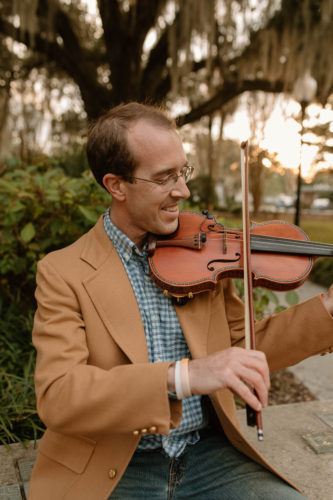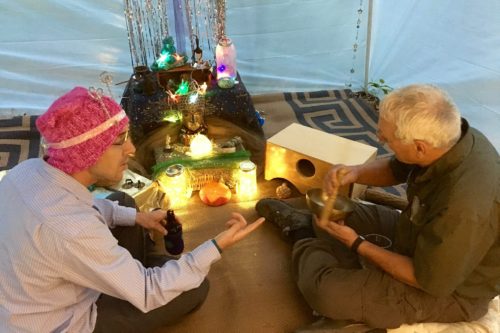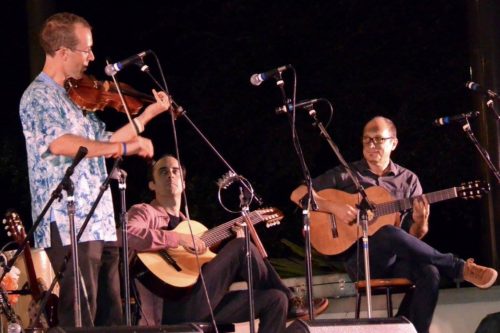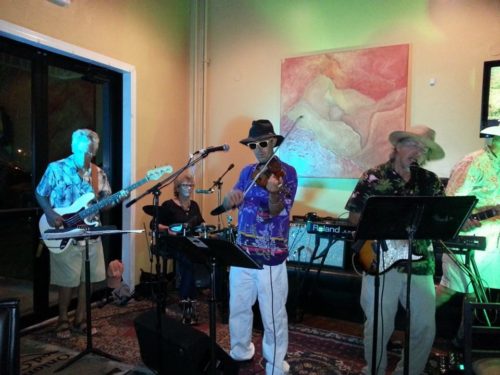With academic and professional training in violin performance, Ethnomusicology, Neuropsychology, and social engagement, Aaron Colverson is combining these passions through his research, teaching, and performance. Aaron earned his BM in Professional Music from Berklee College of Music and is now a Ph.D. candidate in Ethnomusicology at the University of Florida. His dissertation includes the study of rhythm perception, learning and performance in the healthy aging population, as well as disciplinary-competency building between members of his dissertation committee. Aaron is also a Research Associate with the UF Center for Arts in Medicine, where among several projects focused on arts participation and public health, he received a pilot grant from the Center to draw attention to ways in which arts participation may assist in climate mitigation strategies.

We checked in with Aaron to learn more about his past experiences and future goals related to ethnomusicology, understanding people’s moods and behavior, and climate action.
ClimateMusic: Who or what inspired you to pursue violin performance, and how did you come to combine your musical interests with environmental advocacy and communications?
AC: I was raised in a small community in upstate New York and one day, the elementary school I attended hosted “musical instrument day.” It was an exciting day because it was my first exposure to seeing a violin. I’m not sure what possessed me, but for whatever reason, I was immediately drawn to the violin on display. Students at the school were offered opportunities for music classes and if memory serves me correctly, I enrolled that term in orchestra class. As this class progressed, I became more and more passionate about learning music and most days after school, I would sit at the piano and simply read music while playing the violin. My mom noticed I had a passion for this and after about a year or so, began taking me for private lessons with a local violin teacher. It was a very nurturing environment and I’m lucky to have been born with both a passion and the surrounding support network!
Regarding combining my musical interests with environmental advocacy and communications, my father raised my brother and I in the natural world. Living in upstate New York had significant perks when it came to camping, canoeing, and hiking, and our Dad took every opportunity away from his work as an Environmental Science professor to give us chances for experiential learning. With this background, combined with the opportunity and passion to begin music studies at a young age, I was given a toolkit to think about and practice music from both a social and biological lens. After all, homo sapiens are one of many musical species on Planet Earth and educating others as to the possibility for this kind of thought process opens doors for necessary dialogue around ways of being and knowing.
ClimateMusic: After completing your Bachelor of Arts degree at Berklee College of Music, you went on to live in Kenya, performing with and learning from other musicians in East Africa. Could you tell us about what brought you to Kenya and any formative experiences that you had there, as both a performer and learner of East African cultural traditions? How have these experiences shaped your perspectives on ethnomusicology, the study of the social and cultural factors that influence and reflect non-Western musical practices?
AC: Living in Kenya changed my life. After graduating Berklee College of Music, I was trying to make a living as a performer, educator, and small-scale arranger in Boston. It was very challenging to do so and to make ends meet, I was working as a manager at a local cafe. I knew I could make something happen with my connections through Berklee and low and behold, through dialogue with one of the security guards of one of the Berklee buildings, I became aware of an informal exchange program he was organizing called Global Youth Groove. I decided to join the bandwagon, attended an orientation to the exchange program and signed a confirmation to participate soon after. Global Youth Groove was a cultural exchange program between young American adults, their chaperones, and Kenyan youth, adults, and families. We particularly exchanged musical backgrounds and interests, but we also exchanged fashion styles, social and political ideas, as well as thoughts on globalization and historical influences associated with the East African region. When considering these things retrospectively, I again will state that living in Kenya changed my life. I simply did not know about the history of this part of the world, the rich cultural traditions, dynamic ethnic diversity, resilience to colonial impressions, and a forward looking younger generation committed to empowering themselves.
Building upon the above, in a certain way, my time in Kenya was an example of ethnomusicology. Though I did not conduct a formal ethnography, the experiences shared above represent what many ethnomusicologists do: embed themselves in a non-Western musical world, interact and learn from native or indigenous groups, and share their experiences with others. The focus on music is enriched through learning about the historical and cultural traditions of Kenya and the East African region, including Ethiopia, Tanzania, Uganda, Somalia, and Rwanda.

Importantly, I’ve gone down a hybridized route within ethnomusicology, a sub-discipline referred to in the academic literature as medical ethnomusicology. My journey here builds upon the social inequities I observed while living in Kenya and a desire I developed to both learn about and contribute to ways in which music may facilitate empathy with and compassion for individuals and groups who are born into conditions that limit their ability to pursue a high quality of life. This lived experience significantly shaped my desire to integrate biological and social scientific study of music; how it may be one of our species’ greatest tools to connect with one another and think and feel from the other’s perspectives.
ClimateMusic: You’ve also dedicated your Master’s and doctoral research to exploring the relationships between memory, music, aging, and empathy. Are there any ways that you see this work being further expanded to climate communication strategies and connecting with audiences who might be less engaged in environmental awareness, such as communities of older adults, or those without the means or education to prioritize climate action?
AC: I’m so glad you asked this question. In an essay I wrote about ways in which musicking (Small, 1998) may help address the social challenges of anthropogenic climate change (e.g., misunderstanding, miscommunication, mistrust, misinformation), I detail how memory for music heard in an individual’s past can alter their mood state from one of potential anxiety or agitation to one of relative happiness. This process can have a positive impact upon the moods of friends and family of that given individual, particularly individual’s with memory impairment. The rationale for this process can be reviewed in further detail within Colverson et al. (2022). A reason for this is perhaps the, as Ian Cross stated (1999), “floating intentionality” present within a social atmosphere when familiar music occurs. To apply this thought process to climate communications, I argue in my essay that familiar music may play a critical role in shifting often tense and reactive social atmospheres to those conducive to respectful idea exchange. There is a great deal of work to be done to test this thought process and I propose a way to do this from a research perspective. We know music can impact our emotions, but how we can direct these transitions in emotional state to purposeful action specific to climate mitigation is an underdeveloped area and in need of application.
ClimateMusic: At ClimateMusic, we believe that music has unique emotional power that can drive listeners to pursue climate action. In what ways have you been able to integrate your diverse fields of interest in an interdisciplinary approach to have an extraordinary social impact? What do you envision this impact to look like for local communities?
AC: Building upon my response to the prior question, the history of our species has always involved musicking (Small, 1998) in some capacity. (I draw specific attention to the gerund ‘musicking’ at this time to note that music is something that human beings do, whether listening, making, arranging, or composing.) This suggests that musicking is interwoven into what it means to be a homo sapien on planet Earth. From this perspective, we can surmise that integrating uses of musicking to direct individuals and groups to pursue climate action is a critical part of this very mission. Applied to local communities, I would argue that a first step is identifying styles and/or genres of music that have value and meaning to those communities. This may take time to identify and time to convince local communities of the reasoning behind why such identification is necessary. Through this process, however, I argue that establishment of common music preferences (and other arts, cultural, or social preferences, e.g., forest bathing) between individuals and groups will shape the quality of the interactions between them as directed to climate action or other critical social action needed to improve quality of life for all.

ClimateMusic: How do you aim to use your interdisciplinary work to promote social and environmental change? What would you hope to see in the future of your fields, as well as the future of the science and art intersection as a whole?
AC: As a researcher, I will continue to promote the interdisciplinary and intersectional study of musicking (Small, 1998) into mainstream academic practices. What I mean is that the history of academic practices in the United States has disconnected the study of musicking from other fields of study, such as public health or ecology. This process has limited the potential of drawing mutual strengths from combining their independent study into interdependent study. Furthermore, this has limited any potential in applying their interdependence. I would hope to see the future of the arts and sciences again rely upon one another (such as the practices of Plato and Socrates), wherein their mutual attribution shapes homo sapiens’ future ways of knowing and being on Planet Earth. I am not alone in these efforts by any stretch of the imagination, but a great deal of work is needed to shift existing social and cultural mindsets around the mutual exclusivity of the arts and sciences, particularly from the perspectives of the everyday US-based consumer.
As a musician, I will continue to perform music in a soulful, honest and open way. I, too, believe in the power of music to drive listeners to pursue climate action and contributing to this belief, in my opinion, requires constant vigilance on behalf of the performer to convey musical information transparently and with authenticity. Feeling this power of music individually and collectively is a phenomenon not easily described in words, particularly considering the social and cultural diversity of music across the Planet. However, perception of aspects of music-sound relate between cultural groups despite differences, such as shown by Mehr et al. (2018) in their study on form and function in human song. Findings from research like this fuels my passion to continue performing music in the soulful, honest and open way I previously stated. Among many others (e.g., Kirschner and Tomasello, 2010; Rabinowitch et al., 2013), Mehr et al. (2018) promote the possibilities that through musicking, two or more individuals can align their intentions to accomplish mutually beneficial goals, perhaps even lasting and meaningful social and environmental change to improve the quality of life’s bounties for subsequent generations.

ClimateMusic: Finally, how can we keep up with everything you’re working on?
AC: For my academic work, I can be found on Researchgate, which I regularly update. I am involved in many social networks, too, including the University of Florida (UF) Center for Arts in Medicine’s Interdisciplinary Research Lab and UF School of Music’s Musicology/Ethnomusicology Program. I am a student co-lead of the Student Affinity Group for the Sound Health Network, which has an active website. I am also an active member in the Gainesville, FL music community, playing with bands like the Weeds of Eden, Wirebirds, Trinity United Methodist Church, and Michael Claytor and Friends, and for several studios including Pulp Arts and Blackbear studios.